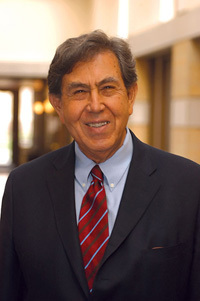
Mexican democracy advocate Cuauhtémoc Cárdenas will be awarded the Notre Dame Prize for Distinguished Public Service in Latin America at a ceremony in Mexico City on Feb. 16.
Established in 2000 by Notre Dame’s Kellogg Institute for International Studies and funded by The Coca-Cola Foundation, the Notre Dame Prize recognizes the efforts of visionary leaders to enhance the region’s welfare. The award carries a $15,000 cash prize, with a matching amount donated to a charitable organization recommended by the laureate. This year’s matching prize will be donated to “Hermanos en el Camino” (“Brothers on the Road”), a shelter for migrants in Oaxaca, Mexico founded in 2007 by a Spanish priest.
“The fact that the Notre Dame Prize is going to a Mexican statesman underscores the tremendous strides that Mexico has undertaken over the last 20 years in expanding and consolidating a true democracy,” says Scott Mainwaring, Notre Dame political scientist and director of the Kellogg Institute.
An unwavering advocate for democracy and justice, Cárdenas was instrumental in opening up the political process in Mexico, long dominated by the one-party rule of the Institutional Revolutionary Party (PRI). Cárdenas broke “the logjam of the authoritarian system,” says Dain Borges, associate professor of history at the University of Chicago.
In 1987, Cárdenas challenged the PRI’s unwritten rule that allowed presidents to designate their own successors. Leaving the party, he ran for president in 1988. He came very close to winning against the PRI candidate – an election many Mexicans contend was stolen by the government.
The son of one of Mexico’s most revered PRI presidents, Lázaro Cárdenas, Cuauhtémoc
rose through PRI ranks before becoming fed up with the party’s increasing corruption and electoral fraud. A civil engineer by training, he served as senator and then governor of the state of Michoacán. In 1989, he founded the Party of the Democratic Revolution (PRD) and in 1997 was elected mayor of Mexico City. He ran for the presidency again in 1994 and 2000.
Currently president of the Fundación para la Democracia (Foundation for Democracy), he has remained active in efforts to confront problems facing Mexico.
“Addressing poverty and expanding Mexico’s formal economy are necessary parts of any strategy to stem drug trafficking and drug-related violence and to provide alternatives to those leaving Mexico for the United States,” he said.
Contact: Elizabeth Rankin, writer/editor, Kellogg Institute, 574-631-9184, erankin3@nd.edu